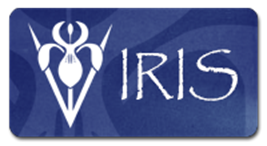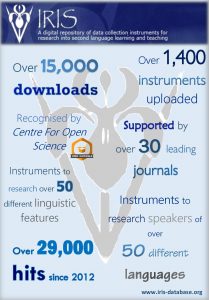 Editor’s note: In this piece, Sophie Thompson (University of York), Alison Mackey (Georgetown University), Emma Marsden (University of York), and Luke Plonsky (Georgetown University) share information about IRIS.
Editor’s note: In this piece, Sophie Thompson (University of York), Alison Mackey (Georgetown University), Emma Marsden (University of York), and Luke Plonsky (Georgetown University) share information about IRIS.
IRIS is a web-based repository of research instruments and tools for use in second language research. It is a freely accessible resource designed to facilitate research for teachers, students, and researchers. IRIS contains more than 1,400 materials. These materials include a range of different kinds of tests for a variety of linguistic features in a number of languages. It also contains communicative tasks and activities, teaching intervention materials, questionnaires, interview protocols, observation schemes, software scripts, sound and video files, among many more types of materials. IRIS is searchable by the kind of material you are looking for, the sort of research you are interested in, the names of contributing researchers, learner characteristics (e.g. age, first language, proficiency), the language being learned, linguistic features and the type of instruction, among many other parameters. The materials available on IRIS are free to download, can be adapted to suit your own requirements, and have all been used in peer-reviewed studies on second language learning and teaching.
Since its launch in 2012, with initial support from the UK’s Economic and Social Research Council and long-term support from the British Academy, IRIS has attracted a great deal of interest internationally, with more than 29,200 hits and over 15,000 downloads. In the last year alone, there have been over 5,000 downloads and the number of hits has almost doubled. This level of activity illustrates the increasing use and impact of IRIS in language learning and teaching research. It is also a sign of the field’s growing recognition of the place and value of replication and, more generally, open science practices.
IRIS has been endorsed by many leading academic journals and research associations in the field, including the American Association for Applied Linguistics (AAAL), the British Association for Applied Linguistics (BAAL), TESOL Quarterly, and Foreign Language Annals, and by top investigators in the area of language learning and teaching. Consequently, up-to-date and relevant research instruments are being regularly uploaded to the site, making a range of high quality tools available. Furthermore, IRIS now also holds two special collections containing all the grammaticality judgement tests and self-paced reading tasks published in second language research. These can be found under the “special collections” button on the IRIS search page.
IRIS has been used by teachers, researchers and students to help investigate a wide range of substantive topics. Teachers are able to use or adapt instruments from IRIS, for example, for assessing learners’ needs, considering how best to give feedback or design teaching materials, or understanding how learners are motivated. Graduate students can adapt instruments to investigate a wide range of areas in TESOL and applied linguistics, for example, cross-linguistic influence, sentence processing, testing, to name but a few. Researchers can use IRIS to share their own materials, to increase the impact and exposure of their work, and to replicate and build on the work of their colleagues. Using instruments from IRIS can assist the field in overcoming the lack of replication studies on language learning and teaching research and extend the generalizability of findings to different settings, demographics, target languages, and so forth.
In summary, IRIS is a user-friendly, searchable, easily accessible database which can be used as a resource by all those involved in second language research. If you cannot find some specific materials that you are looking for, you can make a request via the Request Materials button on the site. For more information, please see the FAQ on the IRIS website or contact [email protected].

